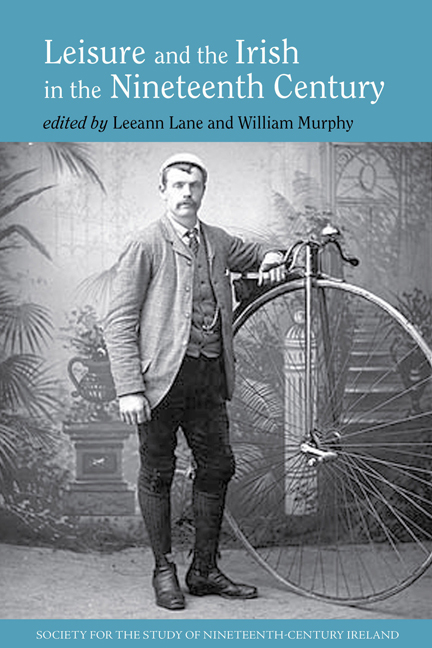Book contents
- Frontmatter
- Contents
- List of Figures and Tables
- Introduction
- Leisure and Associational Culture
- Leisure Spaces
- Leisure in Literature
- Leisure, Tourism and Travel
- Leisure and Female Élites
- 11 Leisure with a Purpose: Women and the Entertaining Practices of the Irish Landed Élite, c.1860–1914
- 12 Lady Charlotte Stopford: A Lady of Leisure?
- Notes on Contributors
- Index
11 - Leisure with a Purpose: Women and the Entertaining Practices of the Irish Landed Élite, c.1860–1914
from Leisure and Female Élites
- Frontmatter
- Contents
- List of Figures and Tables
- Introduction
- Leisure and Associational Culture
- Leisure Spaces
- Leisure in Literature
- Leisure, Tourism and Travel
- Leisure and Female Élites
- 11 Leisure with a Purpose: Women and the Entertaining Practices of the Irish Landed Élite, c.1860–1914
- 12 Lady Charlotte Stopford: A Lady of Leisure?
- Notes on Contributors
- Index
Summary
Went to see Mrs. Leader in morning. The Aldworths came to lunch at 1.30 and did not leave till 5.30!! At 4.40 p.m. I got a telegram saying Mr Barry & Mrs[,] two of his girls and Harold were coming to dine and sleep – He sent the telegram early and it should have been sent to me sooner – The Jones, Capt.[,] Mrs & 2 daughters called & had tea.
Esther Grehan, diary entry, 19 May 1894This was a busy, but not atypical day for Esther Grehan, the wife of a North Cork landlord. She was a member of the leisure class, and spent her life in the ‘non-productive consumption of time’. Conspicuous leisure served a myriad of purposes for the landed élite in Ireland during the period 1860–1914. Not least was Veblen's understanding that ‘a life of leisure is the readiest and most conclusive evidence of pecuniary strength’. Leisure activities demonstrated wealth, they could also demonstrate taste, and therefore the intrinsic right of the family to occupy their position among the ruling élite. Beyond the symbolic values of conspicuous leisure activities, such events could also provide opportunities for genuine enjoyment and pleasure for those involved. For Esther, and other women like her, welcoming those of a similar social standing into their homes was both a duty and a pleasure. Leisure, entertaining, and class identity were intrinsically bound up in the Irish homes of the landed gentry and aristocracy. This chapter will look specifically at the female role of hosting and will examine, in particular, the country-house party at the turn of the nineteenth and twentieth centuries. Women were essential to the ritual of hosting. It was one of their primary roles as the wife of a prominent gentleman, and one that conferred considerable responsibility, but it was also the best way for them to maintain meaningful relationships with their family and friends. For such women, entertaining was a leisure pursuit, but it was also a requirement of their social position. The chapter uses a sample of families whose primary family seat was in Munster. These include the families of the Earls of Bantry, Viscounts Doneraile, Barons Inchiquin, Carbery and Colthurst, as well as the O'Briens of Cahirmoyle, Herberts of Muckross, and the Catholic Grehans of Clonmeen and Ryans of Inch.
- Type
- Chapter
- Information
- Leisure and the Irish in the Nineteenth Century , pp. 209 - 225Publisher: Liverpool University PressPrint publication year: 2016



